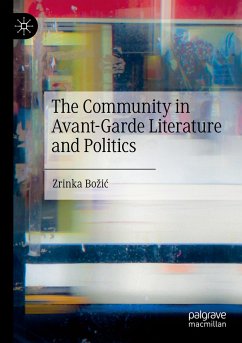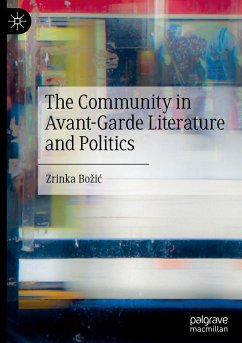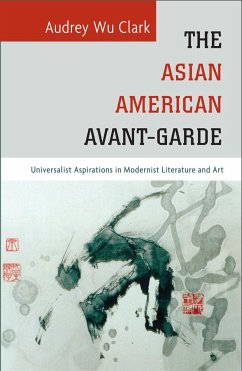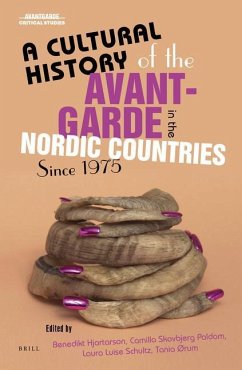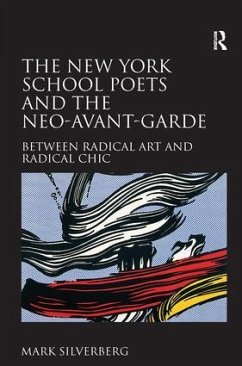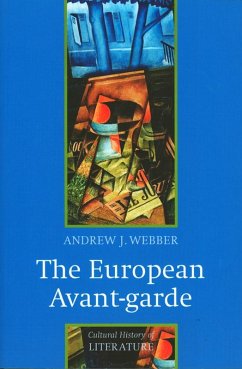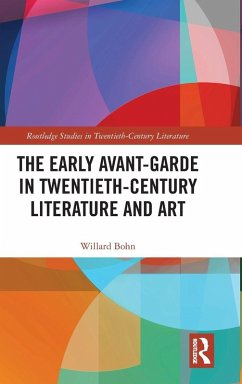
Theorizing the Avant-Garde
Versandkostenfrei!
Versandfertig in 1-2 Wochen
104,99 €
inkl. MwSt.
Weitere Ausgaben:

PAYBACK Punkte
52 °P sammeln!
In Modernism, Expressionism and Theories of the Avant Garde, Richard Murphy mobilises theories of the postmodern to challenge our understanding of the avant-garde. He assesses the importance of the avant-garde for contemporary culture and for the debates among theorists of postmodernism such as Jameson, Eagleton, Lyotard and Habermas. Murphy reconsiders the classic formulation of the avant-garde in Lukacs and Bloch, especially their discussion of aesthetic autonomy, and investigates the relationship between art and politics via a discussion of Marcuse, Adorno and Benjamin. Combining close text...
In Modernism, Expressionism and Theories of the Avant Garde, Richard Murphy mobilises theories of the postmodern to challenge our understanding of the avant-garde. He assesses the importance of the avant-garde for contemporary culture and for the debates among theorists of postmodernism such as Jameson, Eagleton, Lyotard and Habermas. Murphy reconsiders the classic formulation of the avant-garde in Lukacs and Bloch, especially their discussion of aesthetic autonomy, and investigates the relationship between art and politics via a discussion of Marcuse, Adorno and Benjamin. Combining close textual readings of a wide range of films as well as works of literature, it draws on a rich array of critical theories, such as those of Bakhtin, Todorov, MacCabe, Belsey and Raymond Williams. This interdisciplinary project will appeal to all those interested in modernist and avant-garde movements of the early twentieth century, and provides a critical rethinking of the present-day controversy regarding postmodernity.
Table of contents:
1. Theories of the avant-garde; 2. Revisions of Bürger's theory; 3. Re-writing the discursive world: revolution and the expressionist avant-garde; 4. Counter-discourses of the avant-garde: Jameson, Bakhtin and the problem of realism; 5. Döblin and the avant-garde poetics of expressionist prose; 6. Benn: modernity and the double bind of rationality; 7. Bakhtin and double voiced discourse: Döblin's 'The Murder of a Buttercup' and the double bind; 8. The poetics of hysteria: expressionist drama and the melodramatic imagination; 9. Kafka's photograph of the imaginary: dialogical interplay between realism and the fantastic (the metamorphosis); 10. Weimar silent film and expressionism: representational instability and oppositional discourse in The Cabinet of Dr Caligari; 11. Framing the interpretation: the frame-narrative and the conflict of discourses; 12. Towards a poetic of postmodernism: simulation, the sublime and the expressionist avant-garde; 13. Lyotard's postmodern sublime and Habermas's 'enlightenment project of modernity': modernism, mass culture and the avant-garde; Bibliography.
Richard Murphy mobilises theories of the postmodern to challenge our understanding of the avant-garde and assesses its importance for the debates among theorists of postmodernism such as Jameson, Eagleton, Lyotard and Habermas. Combining film and literature, this project will appeal to all those interested in twentieth-century modernist movements and postmodernity.
Challenges conventional approaches to the avant-garde through a wide-ranging, interdisciplinary take on postmodernism.
Table of contents:
1. Theories of the avant-garde; 2. Revisions of Bürger's theory; 3. Re-writing the discursive world: revolution and the expressionist avant-garde; 4. Counter-discourses of the avant-garde: Jameson, Bakhtin and the problem of realism; 5. Döblin and the avant-garde poetics of expressionist prose; 6. Benn: modernity and the double bind of rationality; 7. Bakhtin and double voiced discourse: Döblin's 'The Murder of a Buttercup' and the double bind; 8. The poetics of hysteria: expressionist drama and the melodramatic imagination; 9. Kafka's photograph of the imaginary: dialogical interplay between realism and the fantastic (the metamorphosis); 10. Weimar silent film and expressionism: representational instability and oppositional discourse in The Cabinet of Dr Caligari; 11. Framing the interpretation: the frame-narrative and the conflict of discourses; 12. Towards a poetic of postmodernism: simulation, the sublime and the expressionist avant-garde; 13. Lyotard's postmodern sublime and Habermas's 'enlightenment project of modernity': modernism, mass culture and the avant-garde; Bibliography.
Richard Murphy mobilises theories of the postmodern to challenge our understanding of the avant-garde and assesses its importance for the debates among theorists of postmodernism such as Jameson, Eagleton, Lyotard and Habermas. Combining film and literature, this project will appeal to all those interested in twentieth-century modernist movements and postmodernity.
Challenges conventional approaches to the avant-garde through a wide-ranging, interdisciplinary take on postmodernism.






